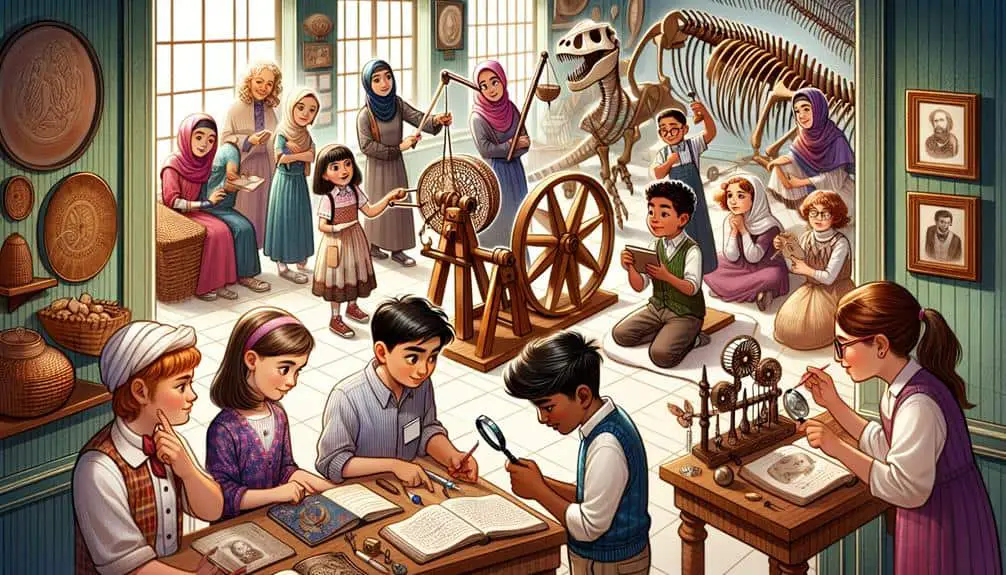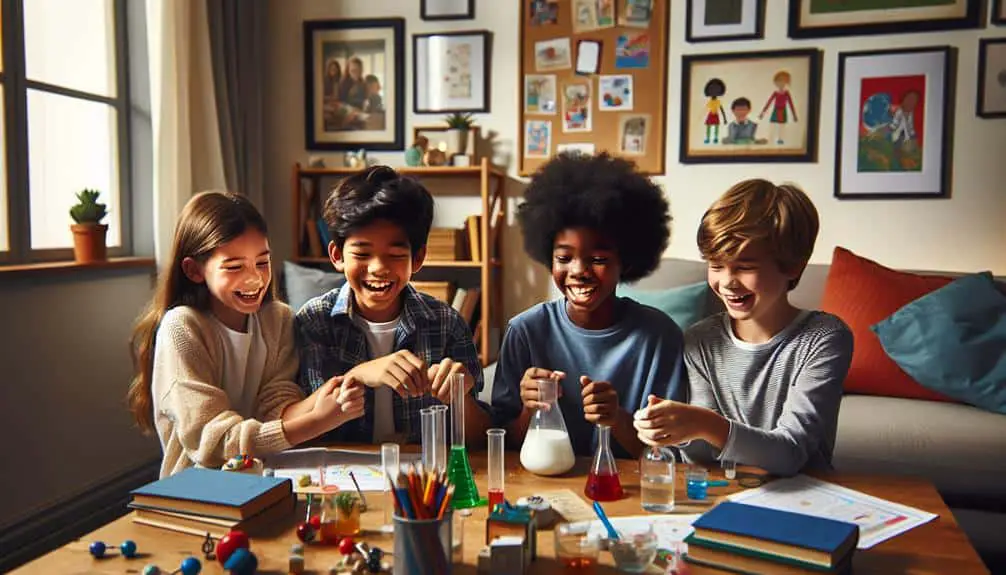Field trips are crucial for homeschool socialization as they enhance communication skills, teamwork, and empathy. These outings go beyond traditional learning, fostering interaction and collaboration. By engaging in group activities, students learn to work towards common goals, communicate effectively, and build confidence in expressing themselves. Participating in diverse social experiences broadens horizons, encouraging critical thinking and understanding different perspectives. These experiences cultivate empathy, cooperation, and respect for others' ideas. Field trips offer unique opportunities for students to develop essential skills outside home-based learning environments. More insights await regarding the benefits of field trips for homeschool socialization.
Key Points
- Enhance socialization skills through interactive group activities.
- Improve communication outside the home environment.
- Build confidence through collaborative engagements.
- Cultivate empathy and cooperation in diverse settings.
- Foster diverse social experiences and understanding.
Benefits of Field Trips for Socialization
Field trips play a pivotal role in enhancing socialization skills among homeschooled students, fostering interaction and communication beyond the confines of traditional classroom settings. One significant benefit of these trips is the opportunity for team bonding. Through engaging in group activities during field trips, students learn how to collaborate, communicate effectively, and work towards common goals with their peers. This teamwork fosters a sense of camaraderie and unity among homeschoolers, leading to improved social skills and a greater sense of community.
Moreover, field trips provide a platform for outdoor exploration, allowing students to step outside their usual learning environments and experience hands-on education in natural settings. Outdoor activities not only promote physical health but also stimulate curiosity, creativity, and problem-solving skills. By exploring new outdoor environments, students develop a deeper appreciation for nature and cultivate a sense of wonder and exploration. These experiences not only enhance socialization but also contribute to holistic development and well-rounded education for homeschooled students.
Enhancing Communication Skills Outside Home
Engaging in group activities during field trips provides homeschooled students with valuable opportunities to enhance their communication skills outside of the home environment. These experiences play a significant role in improving public speaking abilities by requiring students to interact with peers, guides, and other individuals in varied settings. Through activities such as presenting findings from educational tours or participating in group discussions, students can practice articulating their thoughts effectively and gaining confidence in expressing themselves.
Moreover, field trips offer a platform for honing team-building dynamics, as students collaborate with others to achieve common goals or navigate challenges together. These interactions foster skills in effective communication, active listening, and cooperation, which are essential for success in both personal and professional environments. By engaging in group activities during field trips, homeschooled students not only expand their social circles but also develop vital communication skills that will benefit them throughout their lives. Such experiences provide a practical and hands-on approach to learning, allowing students to apply communication strategies in real-world scenarios.
Building Confidence Through Group Interactions
Participating in collaborative group activities during educational outings fosters the development of confidence through interactive social engagements. Engaging in teamwork activities during field trips can greatly contribute to building confidence in homeschoolers. Here's how:
- Shared Responsibility: Working together on tasks or projects during field trips allows individuals to share responsibilities. This shared workload helps in boosting self-assurance as each member contributes to the group's success.
- Peer Support: Interacting with peers in a team setting provides opportunities for offering and receiving support. This mutual encouragement and assistance create a supportive environment where individuals feel more confident in their abilities.
- Effective Communication: Collaborating with others necessitates effective communication. Through teamwork activities, homeschoolers can practice articulating their ideas, actively listening to others, and expressing themselves confidently.
- Problem-Solving Skills: Engaging in group tasks often involves overcoming challenges. By working together to solve problems during field trips, homeschoolers can enhance their problem-solving skills, leading to increased confidence in their ability to tackle obstacles.
Cultivating Empathy and Cooperation
Developing a strong sense of empathy and cooperation is essential for homeschoolers during collaborative educational experiences. Empathy development plays a pivotal role in understanding others' perspectives and feelings, fostering a supportive and inclusive learning environment. Teamwork activities provide homeschoolers with opportunities to practice empathy by working together towards a common goal, encouraging them to communicate effectively, listen actively, and consider their peers' viewpoints. Through engaging in teamwork activities, homeschoolers learn the importance of cooperation, compromise, and respect for others' ideas and contributions.
Participating in group projects and cooperative tasks during field trips can greatly enhance homeschoolers' social skills and emotional intelligence. By engaging in hands-on activities that require collaboration, homeschoolers can cultivate empathy by experiencing firsthand the challenges and successes of working with others. These experiences not only promote a sense of unity and camaraderie but also help homeschoolers develop essential life skills that are valuable in both academic and real-world settings.
Fostering Diverse Social Experiences
To broaden homeschoolers' social horizons, exposing them to various backgrounds and perspectives, fostering diverse social experiences is imperative for their holistic development. Engaging in outdoor exploration and community activities can provide enriching encounters that nurture understanding and appreciation for differences. Here are four key ways diverse social experiences benefit homeschoolers:
- Cultural Awareness: By participating in community events and interacting with individuals from various cultural backgrounds, homeschoolers gain a broader perspective on the world around them.
- Empathy Development: Engaging with people who've different life experiences cultivates empathy and compassion, essential skills for building strong relationships.
- Critical Thinking: Exposure to diverse viewpoints encourages critical thinking and the ability to analyze situations from multiple angles.
- Social Skills Enhancement: Interacting with a diverse range of individuals helps homeschoolers develop strong communication skills and adaptability in social settings.
Through fostering diverse social experiences, homeschoolers can cultivate a rich tapestry of social skills and competencies essential for success in an increasingly interconnected world.




